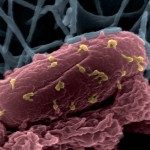Lien vers Pubmed [PMID] – 34431719
Lien DOI – 10.1128/Spectrum.00497-21
Microbiol Spectr 2021 Sep; 9(1): e0049721
Nontyphoidal Salmonella bacteria are the causative agent of salmonellosis, which accounts for the majority of foodborne illness of bacterial etiology in humans. Here, we demonstrate the safety and efficacy of the prophylactic administration of a bacteriophage preparation termed FOP (foodborne outbreak pill), which contains lytic phages targeting Salmonella (SalmoFresh phage cocktail), Shiga toxin-producing Escherichia coli (STEC), and Listeria monocytogenes, for lowering Salmonella burdens in OMM12 gnotobiotic mice. Prophylactic administration of FOP significantly reduced the levels of Salmonella in feces and in intestinal sections compared to the levels in controls. Moreover, the overall symptoms of the disease were also considerably lessened. Dose-dependent administration of FOP showed that phage amplification reached similarly high levels in less than 48 h independent of dose. In addition, 16S rRNA gene analysis showed that FOP did not alter the intestinal microbiota of healthy OMM12 mice and reduced microbiota perturbations induced by Salmonella. FOP maintained its full potency against Salmonella in comparison to that of SalmoFresh, its Salmonella-targeting component phages alone. Altogether, the data support that preventive administration of FOP may offer a safe and effective approach for reducing the risk of foodborne infections caused by Salmonella and, potentially, other foodborne bacteria (namely, STEC and L. monocytogenes) targeted by the FOP preparation. IMPORTANCE Foodborne bacterial infections cause worldwide economic loss. During an epidemic, the use of antibiotics to slow down the spread of the disease is not recommended because of their side effects on the resident microbiota and the selection of antibiotic-resistant bacteria. Here, we investigated the potential for the prophylactic administration of bacteriophages (viruses infecting bacteria) to reduce the burden of Salmonella in vivo using mice colonized by a synthetic microbiota. We found that the repeated administration of bacteriophages was safe and efficient in lowering the Salmonella burden. Perturbations of the microbiota by the Salmonella infection were also reduced when mice received bacteriophages. Altogether, these data support the use of bacteriophages as a prophylactic intervention to lower the spread of foodborne epidemics.



